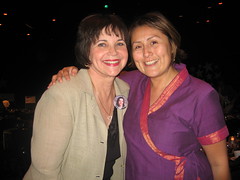We’re on our last review today, from published author Cindy R. Williams.

Kathleen’s comments
Dear Cindy,
I like your “author, harpist, and dreamer” catchphrase. Even though harpist and dreamer don’t necessarily have to do with writing, together they evoke an image of who you are . . . and that is a good thing.
Your overall site design, menu links, and graphics don’t necessarily portray your books, but they’re still nice. And since you’re probably not courting the attentions of children on the Internet, what you have is probably sufficient.
What I’d recommend working on, however, is your text colors and font choices. Right now you have many color changes and a number of font changes, and each one is harder and harder on the eyes. With very few exceptions, black, dark gray, or a color so dark it may as well be black are the color choices for text. Why? Because you want people to notice the pictures your words portray, not the actual letters themselves. To be perfectly honest, multi-colored text is generally considered a hallmark of an amateur website.
The good news is that it’s easy to fix! Change your text on the home page to a black or very, very dark gray (like #333333). Take out the color change code first, before you change all the rest. That way you’re not just adding one color change on top of another. If you have headings, you may choose a bright color for them . . . just use the same color for ALL headings throughout the site, and make sure it’s a color that is easy to read. Use your home page text to focus on your book.
On your books page, use a nice font and color for the titles of your books, if you wish, but use the same dark color and simple font for the rest of the text. Try to keep your text all left-justified as well.
On your news page, it would be okay to use different colors for different sections of news. I would limit it to only two alternating colors, though.
Do similar color simplification throughout the site, and you’ll have a much easier to read and more professional-looking site to enjoy!
God bless!
—Kathleen MacIver, KatieDid Design
Jordan’s comments
Hi Cindy!
Let’s start off with some of the things you’re doing really well: you have your book prominently placed on your site with several options for purchasing. You’re obviously working hard to promote your book and further your career with many appearances. And your site is pretty 😉 .
But of course, there are also a few things you could do to help your site work harder for you. On several pages of your site, I have a hard time understanding what I should be focusing on. I see so many different types of news that I can’t focus on any one thing.
Now, I realize some pages can be kind of a catch-all, but organization can help to guide your website visitors and show them what’s most important. Pretend you’re a first time visitor to your site (I know it’s hard) and look at your site. What do you want to see on the News/Books/Contact page? What is most helpful to you in learning about the book and the author? What might help move you toward buying Chase McKay (or your next book)?
Here’s an example. As a first time visitor, I come to your main page. On my desktop (as shown above), the full title of your book isn’t visible. (On my laptop, it cuts off in the middle of the next line.) If I’m interested enough to scroll down, I wonder what the Arizona Glyph Award is. I see a lot of information about appearances, conferences, a bunch of different options to buy. I see your Thundertail book mentioned as a novel, but without reading the full history of its development, I don’t know what level it’s geared to. Then some more awards, a mention of interviews with you, and a lot of blank space at the end of the page.
Now what do I do? Unless I came to your site with a specific mission, I don’t know. Help us know how to use your site, and what your site can do for us as visitors. (As another example, it would be good on the Contact page to start with the contact form rather than your mailing address—it’s highly likely that people will see just a mailing address and give up without scrolling to the end of the page to find an online way to contact you.)
 Your search engine presence (searching for [Cindy R. Williams]) isn’t bad, especially considering you’re facing some pretty serious competition from this Cindy Williams. (She’s Cindy Williams, but Shirley of Laverne & Shirley has at least a little bit of info about her on the web.)
Your search engine presence (searching for [Cindy R. Williams]) isn’t bad, especially considering you’re facing some pretty serious competition from this Cindy Williams. (She’s Cindy Williams, but Shirley of Laverne & Shirley has at least a little bit of info about her on the web.)
Actually, for [Cindy Williams], Yahoo has your site ranked at #7. (Bing and Google don’t have you in their top ten.) For [Cindy R. Williams], your site is #1 on all three major search engines. However, for some odd reason, Bing lists your Privacy Policy and Copyright pages only. Google lists your site and several mentions of you and your book from around the web. Most of Yahoo’s results are about you, but the actress does still get quite a bit of attention.
So what can you do there? Keep doing what you’re doing—get mentions of your book and your blog around the web, and get more links back to your website.
You’re clearly working hard to promote your books online and off. A few simple changes can help your website work even harder for you.
We hope that helps!
What do you think? What do you expect to see on an author’s home page? Books page? News page? What layouts on those pages help you process that information well?
Photo credit: Cindy Williams—Roberta Romero
 This phrasing comes from Josi Kilpack. She points out that no matter how off-base a comment may seem, there may be a kernel of truth in it. Somewhere. And who knows, maybe—just maybe—they were right after all.
This phrasing comes from Josi Kilpack. She points out that no matter how off-base a comment may seem, there may be a kernel of truth in it. Somewhere. And who knows, maybe—just maybe—they were right after all. I think we’ve all been there: we get some piece of advice—from a crit partner, from an editor, from a total stranger—that just doesn’t work for our story.
I think we’ve all been there: we get some piece of advice—from a crit partner, from an editor, from a total stranger—that just doesn’t work for our story. 
 Taylor Lindstrom. She acknowledges that blogging can be a major draw on a writers’ creativity and often very limited time—but it can still be beneficial for any fiction writer.
Taylor Lindstrom. She acknowledges that blogging can be a major draw on a writers’ creativity and often very limited time—but it can still be beneficial for any fiction writer.

 And I just happen to have an orphan almost-kissing scene sitting around. It’s from an idea I’ve had bouncing around for a while and I finally figured out it should be a YA paranormal a few months ago. I’ve slowly been working on plotting it, but other than this half of a scene and some attempts at the opening paragraphs, there’s not much to the story.
And I just happen to have an orphan almost-kissing scene sitting around. It’s from an idea I’ve had bouncing around for a while and I finally figured out it should be a YA paranormal a few months ago. I’ve slowly been working on plotting it, but other than this half of a scene and some attempts at the opening paragraphs, there’s not much to the story. “Lacey,” the blame in his tone matching mine. “All you have to do is act like you’re gonna enjoy it.”
“Lacey,” the blame in his tone matching mine. “All you have to do is act like you’re gonna enjoy it.”
 Your search engine presence (searching for [Cindy R. Williams]) isn’t bad, especially considering you’re facing some pretty serious competition from this Cindy Williams. (She’s Cindy Williams, but Shirley of Laverne & Shirley has at least a little bit of info about her on the web.)
Your search engine presence (searching for [Cindy R. Williams]) isn’t bad, especially considering you’re facing some pretty serious competition from this Cindy Williams. (She’s Cindy Williams, but Shirley of Laverne & Shirley has at least a little bit of info about her on the web.) 
 Unless you’re trying not to overly emphasize a nonfiction or an e-credit, I think you should highlight your publishing credits a little more—for example, on your home page, you could put that above the progress on your latest work. (It’s always good to know that you’re working on something, but a credit is going to be more impressive to potential editors and agents.) You could also promote your book better to help push more sales—a purchase link would be helpful there.
Unless you’re trying not to overly emphasize a nonfiction or an e-credit, I think you should highlight your publishing credits a little more—for example, on your home page, you could put that above the progress on your latest work. (It’s always good to know that you’re working on something, but a credit is going to be more impressive to potential editors and agents.) You could also promote your book better to help push more sales—a purchase link would be helpful there.